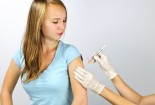As teens across the country begin preparing to become a freshman at college, there are many things to think about. One important thing that is easy to overlook, but should not be brushed aside, is their health care. When they are away at college, teens are exposed to a wide variety of pathogens and germs that perhaps weren’t found at home, and having up-to-date immunization is vital.
Linda Reid, MD, a spokesperson for the American Academy of Pediatrics (AAP) strongly urges upcoming freshman to be current on several vaccinations.
The first one that may come to mind is measles, since outbreaks have been cropping up everywhere across the United States, including colleges in California, Arizona, and Illinois. Before entering college, students should have received both doses of the MMR (Measles, Mumps and Rubella) vaccine. Measles can cause pneumonia, and inflammation around the brain (encephalitis), which can lead to death.
By getting the vaccine, your teen has a strong defense against what can be a potentially serious illness. According to the Centers for Disease Control (CDC), the MMR vaccine is very effective. With a 97 to 99 percent effectiveness rate, you are considered immune of you’ve received both doses of the measles vaccine.
Chicken pox is another illness that should be vaccinated against. There are two doses for the chicken pox vaccine, comprised of a base vaccine and the booster shot. Getting both is critical for proper defense against this illness. Like measles, chicken pox can cause pneumonia and encephalitis, and is often more dangerous in older kids.
While the human papillomavirus (HPV) vaccine is recommended at age 11 or 12, if your child still hasn’t received his or her vaccination by the time they reach college (and aren’t yet sexually active), it is still worth getting as the HPV vaccine can help prevent cancer. HPV can cause cervical and anal cancer, as well as cancer of the mouth and throat areas.
People perceive tetanus as a risk only if you happen to step on a rusty nail, according to Dr. Reid. This is not the case, because gardening and other outdoor activities can also put you in danger of developing tetanus. Lockjaw is perhaps the most dangerous aspect of tetanus, as it can be fatal since it prevents you from eating. The tetanus vaccine (Td) helps protect against not just tetanus, but also whooping cough, which can cause restlessness in teens and death in young children with weak immune systems.
Lastly, Dr. Reid advises parents to keep their children current on meningitis vaccines. Meningitis is typically spread through bacteria, and can live in the nose and throat without causing disease. At college, people may be more at risk in close quarters such as dormitories, frat houses, or sorority houses. Thankfully, there is a vaccine called meningococcal conjugate. It protects against four types of meningitis: the A, C, Y, and W-135 strains. Recently, another strain of meningitis, type B, caused outbreaks in California and the East Coast. A vaccine for type B has finally been approved, and should be available soon.
Before your teen leaves for college, consult his or her pediatrician and make sure all vaccinations are current. Even after your college kid is away at school, you should stay up to date on administration guidelines for vaccines, especially the new ones like meningitis type B. By keeping your kids properly vaccinated, you can help ensure their stay at college is a safe and healthy one… and one where they can concentrate on learning.
In the accompanying audio segment, Linda Reid, MD, discusses your child's health care needs when heading to college.
Selected Podcast
Immunization Information for Kids Heading to College

Featuring:
 Yolanda (Linda) Reid Chassiakos is a Fellow of the American Academy of Pediatrics and a Clinical Assistant Professor of Pediatrics at the David Geffen School of Medicine, UCLA. A graduate of the Georgetown University School of Medicine, she is the Director of the Klotz Student Health Center at California State University Northridge, and a founding member of the American Academy of Pediatrics Media Resource Team.
Yolanda (Linda) Reid Chassiakos is a Fellow of the American Academy of Pediatrics and a Clinical Assistant Professor of Pediatrics at the David Geffen School of Medicine, UCLA. A graduate of the Georgetown University School of Medicine, she is the Director of the Klotz Student Health Center at California State University Northridge, and a founding member of the American Academy of Pediatrics Media Resource Team.
Linda Reid, MD
 Yolanda (Linda) Reid Chassiakos is a Fellow of the American Academy of Pediatrics and a Clinical Assistant Professor of Pediatrics at the David Geffen School of Medicine, UCLA. A graduate of the Georgetown University School of Medicine, she is the Director of the Klotz Student Health Center at California State University Northridge, and a founding member of the American Academy of Pediatrics Media Resource Team.
Yolanda (Linda) Reid Chassiakos is a Fellow of the American Academy of Pediatrics and a Clinical Assistant Professor of Pediatrics at the David Geffen School of Medicine, UCLA. A graduate of the Georgetown University School of Medicine, she is the Director of the Klotz Student Health Center at California State University Northridge, and a founding member of the American Academy of Pediatrics Media Resource Team.